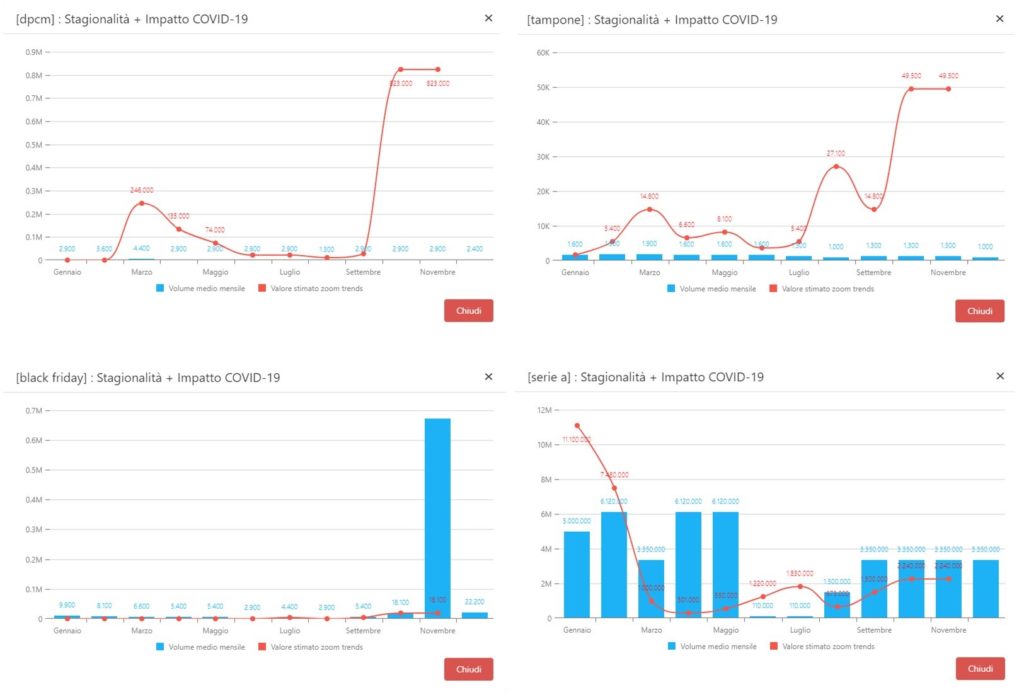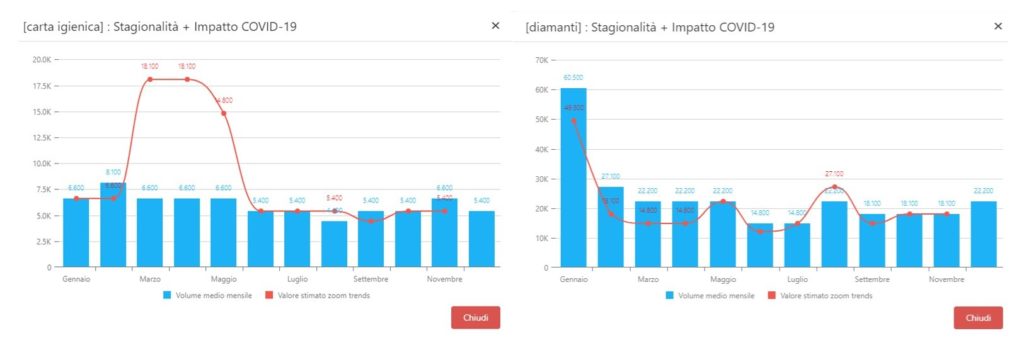Europeans and Google, new trends on the Coronavirus
Halloween is behind us by now, but it is still a period of great anxieties and fears for European people, who are pouring more and more online looking for information and news on the latest developments on the second wave of infection by COVID-19. This is what emerges from our latest analysis on Google trends, which show that the search engine has become more and more an immediate reference to find out what is happening in the news, also overcoming the interest in other general and daily topics. Our study has been conducted on Google Italy only, but the same trends are similar for other languages/markets as well, since the situation related to the COVID-19 is common in most countries of our continent.
Searches about Coronavirus are back up
In October, in particular, the trend for “Coronavirus“, a keyword that reached an average volume of 60,500 searches per month according to Zoom Trends estimates based on the Covid-19 Impact, the SEOZoom algorithm developed precisely to provide more accurate and up-to-date data to those who work in online marketing.
To have a comparison, it is still far the peak for this keyword (reached back in March with 450 thousand searches), but in the months of “phase 2” the searches had fallen below 50 thousand.
On the rise are also all the keyword related to information on Coronavirus: for instance, the words “contagio” (infection) and “mascherine” (masks) – (respectively, over 5400 and 33 thousand searches estimated) – have basically returned to the levels of last April, and a similar trend is also noted for the volumes of “coronavirus sintomi” (coronavirus symptoms) and “coronavirus bollettino” (coronavirus report).
Anxieties and fears are pouring online
What exactly are Italians looking for on Google? In the study we noticed other indicative keyword to understand the moment we are living, because they tell the anxieties and fears of every day, as already happened in February with the revolution of SERPs caused by the virus.
The result is nothing short of sensational with DPCM, the initials for “Decreto del Presidente del Consiglio dei Ministri” (Decree of the President of the Council of Ministers) that Italian people learned about during the last year: between October and November, the interest in news and rumors for the measures signed by Prime Minister Giuseppe Conte (and because of the practical consequences of these measures for all activities) there were 823,000 average researches, almost four times the level recorded in March.
We have a similar trend with “tampone” (swab), which brings the 50 thousand monthly research and reaches the highest level of the year (even higher than the period of “phase 1” between March and April), as well as “febbre” (fever) and “sintomi” (symptoms) are other terms that are experiencing a higher growth than the historical average of past years: previously, the research in November were on 14,500 and 3600 digits per month respectively (in relation to the beginning of the flu season) while now we are above 22 thousand and 6 thousand (even more than during the month of April).
A real boom also for the query “virologi” (virologists), which nearly 1000 monthly searches (but the peak was in May, with a volume of 2400), as proof of interest and, Perhaps, of the curiosity that the Italians demonstrate towards the affirmations and the advices of this professional category, risen, so to speak, under the spotlights over the last months.
How is changing the daily routine and doubts about Christmas
The increase in some search trends on Google also tells the evolution of everyday life in recent weeks and the change in the perception that Italians have of the situation: terms such as “distance teaching”, “closed schools”, “smart working” and “restrictions” have reached levels similar to those of March, in parallel with the new alarms and new rumors of closures caused by the terrible rise in contagion rates.
In the background, two great fears are coming back, “lockdown” and “curfew”, the two keywords that are now in our common vocabulary and that in recent weeks have marked the peak in research interest both in Italy and the rest of Europe. Greatly increasing is also the variant “lockdown at Christmas”, a possibility that many Italians fear and are starting to reckon (at least online).
The attention on Covid-19 diverts Italians from other topics
In addition to representing a litmus test of the interest that Italians reserve to the very close current, the increase in research on topics related to the Coronavirus and its effects is also linked to another phenomenon, that is to the decrease of a whole series of classically very searched queries or those seasonal of this period, that is traditionally recurrent topics and now unavoidably moved to the background because of the incidence of the virus on our lives.
It starts first of all from the “travels” – sector that we had already seen in dramatic decrease in our previous and more in-depth analysis of Google searches after the Coronavirus – a keyword collapsed from the 18 thousand monthly average searches of past years to the current 5400, as well as uncertainties on travel has led to a reduction in research for “tourism” and “easyjet” (which loses even 70% of the volume, rising from 1.2 million to 368 thousand, the lowest point of the year).
The trend is similar for all research related to coming Christmas: if classically these were the useful weeks to look for advice on “Christmas dinner” or “destinations for Christmas”, this year instead such keywords find no space, crushed by the most urgent daily matters.
The fear of Coronavirus also seems to affect other aspects that apparently appeared as untouchable among the priorities of Italians online: the searches of “facebook“, “instagram” and even “serie a” are all in decline compared to historical averages, and also decreases the number of people who Google words like “sex” and “Tinder“.
Another surprising case is the trend of “Black Friday“, the day of promotional shopping that is now known and widespread in Italy: until last year, the average volume in Italy was 673 thousand searches in November, while now the value estimated by Zoom Trends is just 18,100 searches, i.e a drop of 97% compared to a “regular” period.
Searches on Google describe today’s Italy (and Europe)
Ultimately, instead of looking for possible destinations for Christmas trips, this year people on Google search for Christmas lockdown to know if the possibility of a possible lockdown is real or if December 25 we will be able to celebrate as usual, with our families and without restrictions.
We are not yet at the levels of March and April, when “carta igienica” (toilet paper) was literally more searched than “diamanti” (diamonds), but the analysis of current trends allows us to understand what is happening in our country and how people perceive the current situation.
The first effect is the reduction of research volumes by topics, products and services considered to be of no primary need or difficult to achieve because of restrictions – such as tourism or dating – which is a counterpart to an increasing need to obtain timely information in order to be prepared for each and every scenario.




